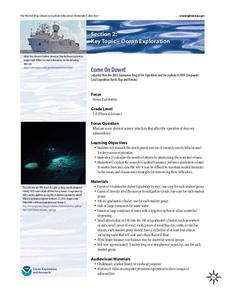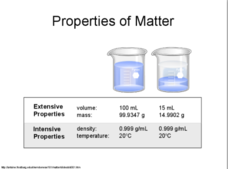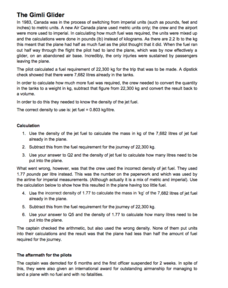NOAA
Come on Down!
What do we do when a dive is too dangerous for humans to accomplish? Send in the robots! Middle school scientists get acquainted with several different models of submersible robots in the second lesson of six from NOAA. Lab groups then...
NSW Department of Education
Relationships Between Formal Measurement Units: Measure and Record Mass in Kilograms and Grams
Teach the masses about the metric system with this hands-on measurement lesson. Given a fruit or vegetable, learners estimate, measure, and convert its mass using the metric units gram and kilogram.
American Chemical Society
What is Density?
Density: the reason a giant pumpkin will float, but a tiny cranberry won't. Lesson begins with a demonstration of two of the same-sized cubes having different densities. Then pupils take eight cubes, each of the same size, and have to...
American Chemical Society
Density of Water
We know solids have a density we can measure, but what about liquids? Lesson explores this concept and allows scholars to explore the relationship between volume and density. Graphing and analysis questions round out the activity.
Normal Community High School
Density
Change the density of water by adding minerals. The presentation discusses density—from the definition to calculations—and applies it to the real world. It briefly mentions specific gravity, and finishes by showing Archimedes'...
Teach Engineering
Determining Densities
Don't be dense—use a robust resource. The second installment of a five-part Floaters and Sinkers unit has learners determine the densities of several objects. As part of the activity, they learn the displacement method for finding...
Teach Engineering
Floaters and Sinkers
Whatever floats your boat. Young engineers learn about density by measuring the masses and volumes of boxes filled with different materials. Using their knowledge of densities, they hypothesize whether objects with given densities will...
Curated OER
Activity #19 The Density of Alka Seltzer Gas
Students (teachers) complete the activity, they should not come in contact with Alka-Seltzer. They comprehend that the density of a gas can be calculated from its mass and volume. Pupils calculate the volume of gas generated by...
American Chemical Society
Density: Sink and Float for Liquids
We don't think of liquids as floating typically, but a quick look at any oil spill tells a different story. Lesson explores various densities of liquids and why this fact is important. After observing the density variation, scholars...
Royal Society of Chemistry
Gimli Glider—Anecdotes for Chemistry Teachers
What's the moral of this story? Units save lives! Teach measurement conversion through storytelling in a quick math-based lesson. Young scientists learn how one country's decision to swap from imperial to metric standard units caused an...
Cornell University
Buoyancy
Swimmers know to float by turning their bodies horizontally rather than vertically, but why does that make a difference? In an interesting instructional activity, scholars explore buoyancy and the properties of air and water. They test...
Curated OER
Floaters and Sinkers
Fifth graders define density as the amount of mass per volume a material contains, compare the densities of several types of materials, especially those that sink in water compared to those that float. They use two different methods to...
Curated OER
Matter
Students complete a unit of activities to learn about states of matter and how to measure matter. In this matter lesson plan, students complete 8 lessons to learn about matter, its states, and how to measure matter.
Curated OER
Salinity
Learners define and discuss salinity, conduct classroom experiment to determine salinity of water sample by using hydrometer, record predictions, and demonstrate understanding of how salinity influences object's ability to float in water.













